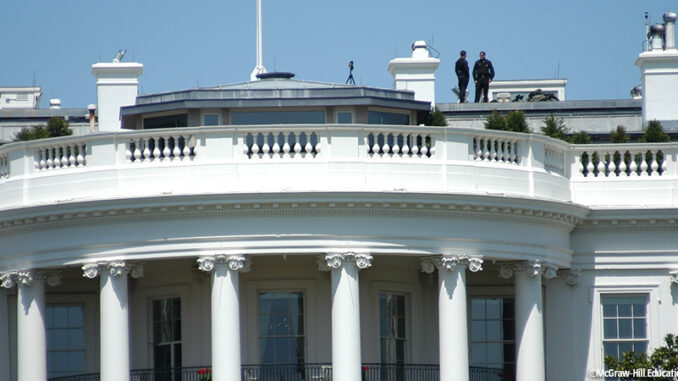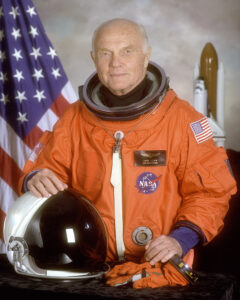
John Glenn Dies at Age 95
John Glenn, one of the seven original American astronauts and the first American to orbit the earth, died on Thursday at Ohio State University hospital in Columbus, Ohio. He was 95 years old.

Glenn made his famous space flight in 1962, during which he orbited the earth three times in five hours, earning him the status of a national hero. Because he was deemed too valuable to risk losing in a space accident, he retired from NASA in 1964 and entered politics. He served as a Democratic senator from Ohio for 24 years–four full terms–and ran unsuccessfully for the Democratic presidential nomination in 1984. Glenn was a military hero as well: as a Marine fighter pilot, he flew 59 combat missions in the Pacific during World War II, and 90 during the Korean War.
In October 1998, at age 77, Glenn finally returned to space, aboard the space shuttle Discovery. He was the oldest person ever to do so. Among his many awards, he is the recipient of the Presidential Medal of Freedom and the Congressional Gold Medal.
Glenn’s death follows heart-valve replacement surgery and a stroke in 2014. He is survived by his wife and high school sweetheart, Annie Glenn; two children, Carolyn Ann and David Glenn; and two grandsons, Daniel and Zach.
Dig Deeper Using Internet resources, create a timeline of the major events in John Glenn’s life and career. What do you think was his greatest accomplishment, and why?
Who Pays for Trump’s Security?
Last Monday, New York City Mayor Bill deBlasio sent a letter to Congress formally asking the federal government to reimburse the city for the cost of providing President-elect Trump’s security: a bill of $35 million dollars.
According to deBlasio, the expense is so great because Trump Tower–where Donald Trump and his family currently live–is located on Fifth Avenue in midtown Manhattan, at one of the busiest intersections in the country. The amount of foot traffic has greatly increased since the election as tourists hope to catch a glimpse of Trump or a member of his cabinet, and vehicle traffic in the area is even more congested than usual. Traffic officers, uniformed officers, and many others are necessary in order to in to maintain the level of security required by the Secret Service. The bill is for $50,000 per day, from the date of Trump’s election on November 8 to his inauguration on January 20. His wife, Melania, and his son, Barron, plan to remain at Trump Tower at least through the end of the school year, which will drive the cost of security even higher.
Though the federal government has traditionally reimbursed cities for security costs associated with major national events (such as national conventions), there are no existing laws that require the government to do this. Therefore, Mayor deBlasio requested new federal spending to cover the costs. The following day, however, Congressional Republicans responded with a budget resolution to repay $7 million to the city of New York–only 20 percentof what deBlasio requested. Though deBlasio expressed his disappointment, he made it clear that the New York Police Department will continue providing security to Trump Tower regardless of the setback.
What Do You Think? Who should bear the financial burden for Donald Trump’s security: the city of New York, or the federal government? Why?
New Developments in Gatlinburg Fire
Two minors were arrested last Wednesday and charged with starting the wildfire that spread throughout eastern Tennessee and Great Smoky Mountains National Park in late November, killing 14 people and leaving an unprecedented path of destruction through the most-visited national park in the United States.
The “Chimney Tops 2” fire was first reported on November 23. By November 28, the fire had spread to Gatlinburg, a tourist town of roughly 4,000 people which draws more than 11 million visitors each year.
The fire–the worst in the area in at least a century–was particularly devastating for several reasons. First, the area experienced hurricane-force winds of up to 87 miles per hour, which spread the fire quickly. Secondly, a historic drought had left the area parched and quick to burn. And finally, many Gatlinburg residents didn’t receive evacuation notices until after the fire had already entered the city. By the time the wildfire was contained in early December, more than 2,450 buildings had been damaged or destroyed, 14 people were dead, and another 150 were injured.
The alleged arsonists are confirmed to be Tennessee residents, though no other information has been released about them, including age and gender. The local prosecutor has said that he may decide to try the minors as adults. While downtown Gatlinburg was spared by the blaze, 112 people are still homeless and sheltered by the American Red Cross as of Friday.
What Do You Think? Do you think teens should be tried as juveniles or adults when the crimes they’ve committed have especially devastating consequences? Explain your opinion.
Trump and Twitter
President-elect Donald Trump is well on his way to becoming the first “social media president.” Though President Obama has also used Twitter, Trump is the first U.S. leader to do so with this frequency, and to use social media to announce major foreign policy decisions. Lately, his tweets–especially those about foreign leaders–have drawn more and more attention, both from those who admire him for speaking his mind, and from those who worry about the consequences of his words on a global scale.
On December 4, Trump used Twitter to criticize China for devaluing their currency (making it harder for U.S. companies to compete), for heavily taxing U.S. imports when the U.S. doesn’t tax Chinese imports, and for building a military monopoly in the South China Sea. Though Chinese diplomats officially have no comment, much of what Trump tweeted is not true: the U.S. does tax Chinese imports, and the Chinese government has been struggling mightily to prevent their currency from devaluing. These Twitter accusations run the risk of straining relations between the U.S. and China in the future.
This followed a December 2 tweet in which the President-elect risked Chinese anger by acknowledging a congratulatory phone call from the President of Taiwan. China considers Taiwan a Chinese territory and views any reference to its president as a serious insult–a position which U.S. leaders have respected for the past thirty years, until now.
In late November, Trump also took on Cuba via Twitter, tweeting that he would terminate Obama’s diplomatic deals with the nation if Cuba’s leaders do not make certain concessions involving human rights issues. This marked the first time that a U.S. leader has used social media to announce a major foreign policy decision.
Trump’s controversial tweets are not limited to critiques of foreign relations, however. In recent weeks, he has also taken on such topics as voter fraud, the government’s Boeing Air Force One contract, and Alec Baldwin’s portrayal of the president-elect on Saturday Night Live. While Trump’s supporters argue that Twitter is a great way for him to reach a wide range of people quickly–his tweets and Facebook posts are seen by upwards of 25 million people–and without the filter of the traditional news, it must be remembered that his words have serious consequences. Alleging voter fraud when there is no proven evidence of it dangerously undermines peoples’ faith in the democratic system. And within hours of Trump’s tweet about the Boeing contract, the company’s stock dropped temporarily by one percent. As president, he may continue to use Twitter to speak his mind – though hopefully with a greater awareness of the consequences.
